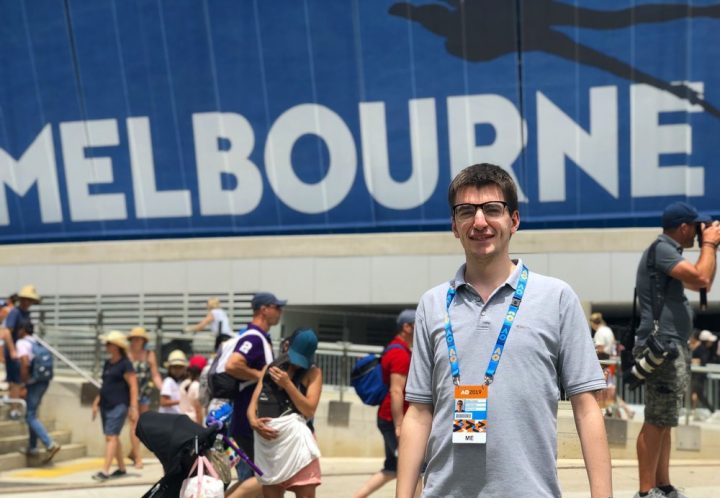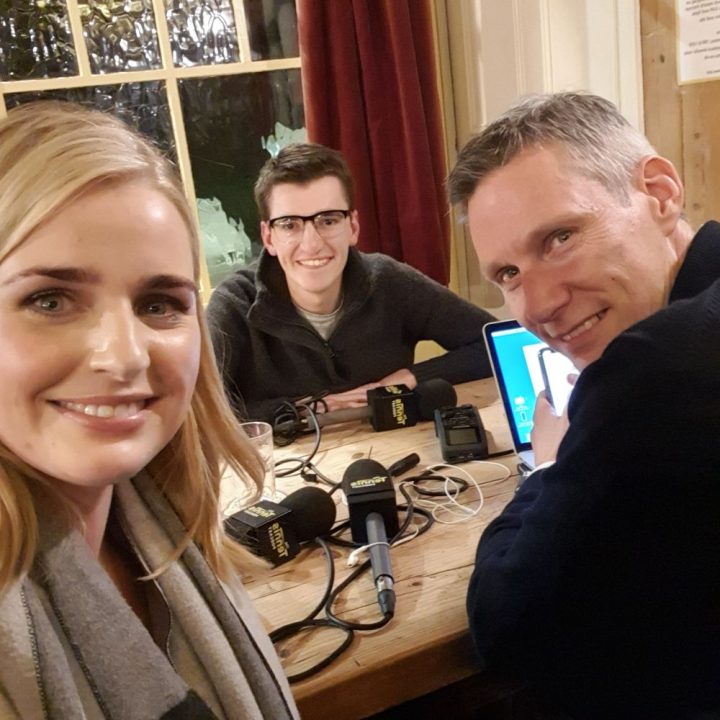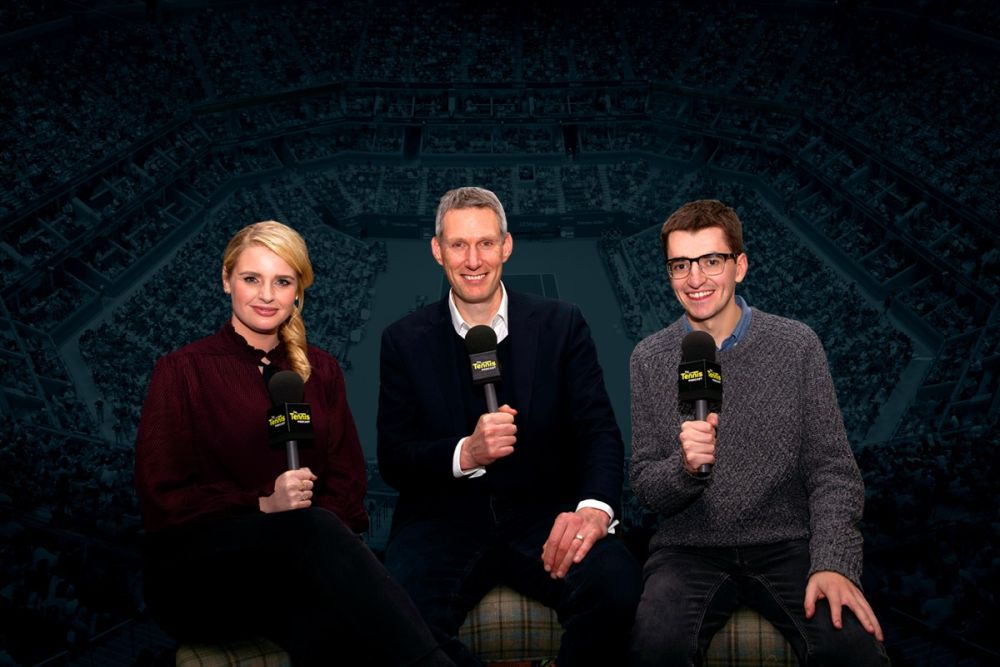Every now and again, in tennis we see some players that after many years of sweat and tears on the ITF or Challenger circuit find that special balance that makes all their efforts come together and produce results that catapult them onto the “main stage”. But it doesn’t happen only to players: sometimes it happens also to ordinary fans like Matt Roberts, 24 years of age from London, who through a series of twists and turns of fate has managed to become one of the voices of The Tennis Podcast, one of the most popular tennis-based podcasts in the world.
The Tennis Podcast was born almost nine years ago from an idea by David Law, former Communication Manager at the ATP Tour and now freelance journalist, and Catherine Whitaker, currently the lead presenter of tennis on Amazon Prime Video in the U.K. The podcast grew year after year and in 2017 it started raising funds through Kickstarter campaigns that have been more and more successful every year.
The Kickstarter campaign for 2021, launched at the beginning of December 2020, reached its £80,000 target in just two days and has now raised over £106,000 with almost two weeks to go until the end. David, Catherine and Matt produce a weekly podcast as well as a weekly newsletter that reaches around 25,000 people every episode, with daily editions at major tournaments.
We caught up with Matt Roberts during the off-season to learn how he managed to turn his tennis passion into a profession.
Matt, when did you start following tennis and how did you get involved with The Tennis Podcast?
“I started following tennis when I was 7-8 years old back then we were living just down the road from Surbiton Tennis Club, where a Challenger tournament takes place every year, but while we were living there, I showed no interest in tennis whatsoever. It all started as soon as we moved. When I was 10 years old my grandma took me to Wimbledon: she had won ballot tickets for Court 1 on Saturday of the second week, so there were no main draw matches to watch, but I managed to see Roger Federer practice on one of the side courts. I remember working my way to the front through a crowd of bodies and taking some shoddy photos, which I still have somewhere, of Federer and Tony Roche on my disposable camera. It was such a cool experience”.
“In terms of the podcast, it all started when I was at the University, where I was studying French and Spanish. During the Easter holidays of my first year, I sent David a tweet asking if they needed a student for some work experience. I had been listening to the podcast for a few years, and my timing just happened to be perfect, because David and Catherine needed some help to keep the podcast going on a weekly basis. They needed some support in terms of social media, planning, research, a bit of everything. For the remaining three years I was working on the podcast in the background while completing my studies at University.”
“I never really intended to be a voice on the podcast, but they took me on part-time in summer 2018, and at some point, a microphone was put in my hand and there I was, broadcasting”.
The listeners to the podcast had heard of “Student Matt” for quite some time before actually hearing his voice, and in a short period of time “Student Matt” turned into “Graduate Matt” and then it became… just Matt.
When was your first time at a tournament with credentials around your neck?
“It was at Queen’s in 2015, just a few months after I had made a connection with them. David wanted me to get on-site and experience a tournament for the first time, I didn’t do much to be honest, I went to the press conferences, watched a lot of tennis,…”
It sounds like a dream…
“It really was! Nadal was there, also Wawrinka who had just won the French Open. I couldn’t believe I was around all these people that previously existed only on TV”.
“I have worked at Queen’s every year since then, and the first tournament with credentials as ‘The Tennis Podcast’ was the ATP Finals 2018. That was a breakthrough for us, because we didn’t know how we would be received as media, and from that point onwards we realized we could be on-site, and produce content while together on-site, which is when we are at our best”.
Was there a moment when it hit home that your life had changed?
“Yes! Going to Australia in 2019, it had always felt like such a pipedream, and then suddenly I was sitting on a plane thinking ‘My word, the podcast listeners have paid for me to go to Australia’. I was full of emotions – gratitude, excitement, some anxiety. And then once I was there it was the day of the Murray-Bautista Agut match, I did not go to bed until 5 a.m., then set my alarm for a couple of hours later, and started all over again. At that point I was completely swept up by the tournament and there was no time to think about anything else. Then, during the following month, it all started to sink in, and all I could think about was going on another trip and doing it again. I had realized that I could do this in my life and I really liked doing this”.

What is the aspect of this job, of this life, that you like the most, and the aspect you could really do without?
“Attending tournaments is what I like the most. Obviously not this year… But you can find better stories when you are there, you can live off the adrenaline, and you can take the listener with you which is powerful for the podcast medium. Also, I love having David and Catherine as both friends and mentors. I get a bit intimidated by the press room environment, rightly or wrongly I believe that other people in there are more experienced and knowledgable than I am, they have earned their right to be there, while I almost stumbled into it. I love how [David and Catherine] represent a safe space for me, and I am really appreciative to have found this so early”.
“What I dislike the most…well, social media is a constant battle and one that I haven’t really figured out yet. I owe a lot to social media, that’s how I got in touch with David, we receive so many lovely messages from listeners on there, and at its best it’s an incredible source for stats and news as well as a powerful marketing tool.”
“But it can also bring out the worst in people and we’ve experienced our fair share of trolling, mainly from people who don’t really listen to our show. Because those who do listen will know that we like to have a laugh and to see the funny side of the sport, while also caring deeply about it and taking our work very seriously. Striking the same tone on social media can be hard. I probably blow things out of proportion, but one nasty comment can feel personal and really ruin your day.”
Being a tennis fan is a very radical life choice: it tends to involve a lot of hours spent in front of the TV, sometimes at unsociable hours. How did it impact your life growing up?
“Following tennis can be such a solitary pursuit, unless you have a group of friends following tennis. But it is enough of a niche sport that most of the time you are alone following tennis, and that’s why social media has had such a big impact on the tennis community, I suppose. I have very fond memories of the Australian Open, when I used to get up early and fit in a few hours before school, and I guess that was a sign that I was foolish and dedicated enough to be a tennis follower”.
And the pandemic is sort of forcing you and all of us to go back to old habits and follow the tournaments on TV from home. During the last US Open you adopted a curious solution to be more efficient, didn’t you?
“Yes. I was supposed to go to New York but of course the pandemic prevented me from doing it. In order to cover the tournament the way we wanted to cover it, it would have meant living on New York time even while in the U.K., and since I live with my parents this would have made the situation quite difficult. So David and Catherine allowed me to rent a place for myself so I could live alone for the two weeks of the US Open. It so happens that there is a caravan site about a 10-minute walk away from my house, so we decided to rent that place and cover the tournament while living there. It was much cheaper than a flat, but I wasn’t slumming it either, and we managed to make it a bit of a theme for the podcast”.
“This sport really takes over your life, your calendar becomes the tennis calendar: you don’t think of April as April, but as the beginning of the clay court season. I guess that’s why I ended up discovering the podcast, because I had one friend who was into tennis, a lot of friends that played tennis but did not follow the tours, and I was looking for conversations”.
“I remember realizing that tennis was my thing when, the day after the 2006 Rome men’s final that lasted five hours, I went into the playground at school saying that I watched all of it, and it gave me a weird sense of pride”.

To conclude the chat, we prepared a lightning round with some specific tennis questions.
Favourite Slam?
Australian Open
Favourite tournament?
It might again be the Australian Open, but from a personal point of view I would have to say Queen’s, because that’s where it all started.
ATP or WTA?
I can’t answer that! Both!
Merger or no merger between ATP and WTA?
I would love to see a merger; I just fear it’s very unrealistic. The strongest events are those where you have ATP and WTA on-site together, so I think that tennis would be stronger if all events were together.
WTA Autumn and WTA Championships all in China. Was it a good idea or not?
Ultimately, the WTA did was right for the tour at the time. They couldn’t have predicted what would happen this year. I think it is good for tennis that the WTA reached the Asian market, it’s where there is the biggest growth potential. I would prefer the Championships events, both ATP and WTA, to move around and remain in the same place only for 2-3 years. I understand the idea of building a base for an event, but I think it is a shame that tennis has not taken the opportunity to move these events around more.
Classic question: best of 3 or best of 5?
I don’t see it as an ‘either/or’. There’s room for both. I would not want to see the best of 5 gotten rid of. We need to keep it.
Which solution for the final set you prefer among those in use at the four Grand Slam tournaments?
If it’s best of 3 I would like to play it out, no tie-break. For best of 5, I like the Australian Open solution, a 10-point tie-break.
Classic Davis Cup or Kosmos Cup?
I find this very hard. I was lucky enough to be at the 2018 Davis Cup, the last one in the classic format, and the atmosphere was incredible. They both have such different advantages and disadvantages. Overall, I believe the format needed reform, so I would go with the Kosmos version, but personally I believe there should be an extra round of home/away, because one is not enough. So it would be better to have 8 teams in the finals, preferably with a knock-out format, and one more home/away round.
Let or no let?
Let.
Ad or no-ad?
Ad.
Coaching or no-coaching?
No-coaching.
Day session or night session?
Night session
UTS or NextGen Finals?
NextGen Finals
Djokovic, Federer or Nadal?
You are setting me up again? What do you mean?
Well, think of it as the game of the tower, where you have to throw two of them off the tower.
You are making it worse! Let everyone live, and I would say all-around I believe Nadal is the best.
At Wimbledon, white or no-white?
No-white.







